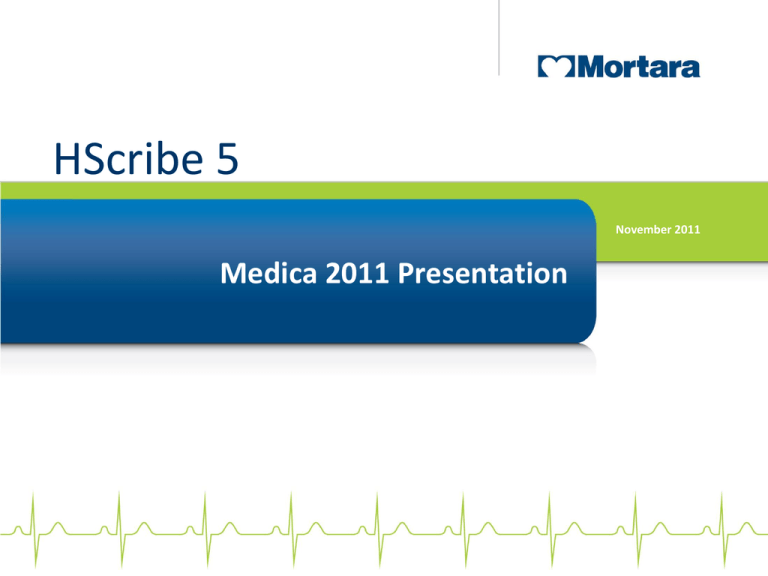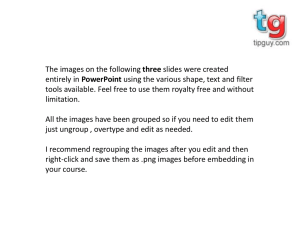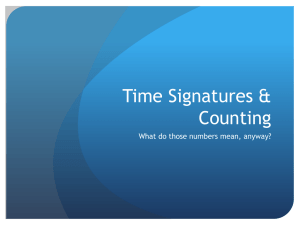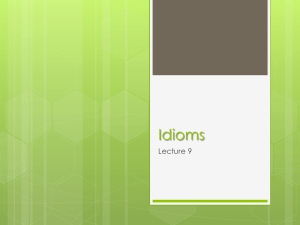New HScribe 5 Modality Manager
advertisement

HScribe 5 November 2011 Medica 2011 Presentation NEW HScribe 5 Key Features & Benefits • Scalable Solutions: Simple to complex system configurations – • • • • • • • From standalone to a network of workstations that can schedule patients, import recordings, review, and generate results – all within a shared database Supports one of the smallest traditional Holter recorders on the market to an advanced High Fidelity 12-lead Holter recorder Multiple scanning choices support traditional as well as advanced Holter review Superior accuracy with Mortara’s VERITAS™ algorithms provides rapid results Web-based Holter data transfer enables fast turnaround time for remote sites Bidirectional interface for HL7 or DICOM® automatic orders, data export and billing Patient monitoring data import for full Holter reporting User roles and permissions ensure patient data security – – – Appropriate tasks can be assigned to each user by the system administrator Physicians can electronically sign reviewed reports Audit trails provide regulatory requirements reporting (support HIPAA compliance) HScribe 5 Holter Analysis System • Schedule – Schedule New Patients • Find existing demographics • Filter criteria for search – • Hookup – – • • User Preferences • System Settings • Exit H3+, H12+ CF card, Web Server, & Surveyor Data Worklist – – • Edit/Modify Patient Data Prepare recorder with data Import Recordings – • Review Orders Imported recordings in wait Edit, Review, Sign, Export Find stored Holter exams – Search Database New HScribe 5 Modality Manager The HScribe 5 Holter Analysis system is available • • As a single workstation system that can support up to 4 networked client workstations that can – – – Import, review and edit recordings Review and edit recordings Import recordings Roles and User Permissions for – – – – • Exam Groups – – – • • In a distributed configuration where the Modality Manager resides on a redundant (RAID) server with at least one or more networked client workstations that can – – – Import, review and edit recordings Review and edit recordings Import recordings Patient demographics Holter Recordings Archive/Restore – – – • Separate Holter exam types Separate User access Separate report formats and lists Search and Schedule – – • IT and Clinical Administrators Clinical Coordinators Holter Clinicians Physicians (optional electronic sign) Individual recordings only Patient demographics only All patient data with exams Audit Trails – Support for HIPAA compliance First Impression - What’s New? • New and improved analysis processes and updated VERITAS™ algorithm for Holter – – – • Dynamic channel switching for all recorded leads (not locked to specific leads) Each beat is checked for signal quality (lower threshold for noisy beat rejection) 48-Hour recordings are analyzed and reviewed as a single recording New updated look and feel – – Color-coded waveform (instead of beat background) Light or Dark background chosen by the user – Ability to customize the display • Right/Left Split • Top/Bottom Split Beat Editing and Identification • New ability to insert and delete beats – – – • New automatic labels – – – – • Ventricular Escape Beat Unknown Beat Atrial Paced Beat Dual Paced Beat New ‘user-added’ labels – – – – • User may insert a beat label anywhere in the waveform User may delete an erroneous beat label (T wave, pacer spike, etc.) preserving the surrounding RR intervals for all calculations An entire region can be excluded from the analysis Aberrant Bundle Branch Block Fusion Interpolated Beat labels on display QT/QTc Analysis Feature • • • • Mortara Linear, Bazett, or Fridericia setting choices for QT correction RR prior, RRc, or RR16 setting choices for RR intervals used with QTc QT/QTc trending with minimum, mean, and maximum reporting QT/QTc trends displayed together with heart rate and RR interval trends A Second Glance - What’s New? • New analysis features – – – – New Bigeminy and Trigeminy detection plus other rhythm identification User-defined rhythms – a label for any rhythm event is possible on a per patient basis Ventricular and Supraventricular Tachycardia settings and identification Min/Mean/Max Heart Rate calculated on Normal only or all beats (user-defined) Expanding on the familiar… • Expanded “Profile” selections grouped for easy review – – – – General: Diary Events, HR, RR, Pauses, ST, RR Variance, QT/QTc Analysis, User Defined Rhythm: Diary Events, HR, Supraventricular Ectopy, Ventricular Ectopy, User Defined Paced: Diary Events, HR, Atrial, Ventricular, Dual Paced beats, Pacer Failures, User Defined All: Everything in one display More Intuitive Intuitive “Prospective” Scanning – – – Stop settings are always displayed Superimposition and paging simultaneous or paging only Choose any recorded channels with ability to display all 12leads in the page view Review & Edit - Histograms • New Histograms Tab – – – – – • RR interval for all beats Supraventricular Prematurity by % Pacer Spike QRS Pacer Spike Ventricular Runs (3 or more) Supraventricular Runs (3 or more) Supraventricular beat navigation and prematurity % – – – No more (confusion with) Supraventricular Templates Immediate recalculation after a label change No need to rescan when adjusting prematurity % Review & Edit – Final Report Strips • New Strips Tab – – – New ability to navigate (hyperlink) to the ECG view by clicking on the strip listing Same ability to add auto-strips Improved ability to edit/delete saved strips Final Report Preparation • New Summary Tab – – – – – – All summary values are editable in this display Check boxes allow the user to include/exclude sections in the final report output Summary items with a value and time appear with hyperlinks Conclusion entry with free-text or a choice of user defined templates and acronyms Customizable demographics and institution logo Option to add electronic signature: “Signed By [Physician Name]”




